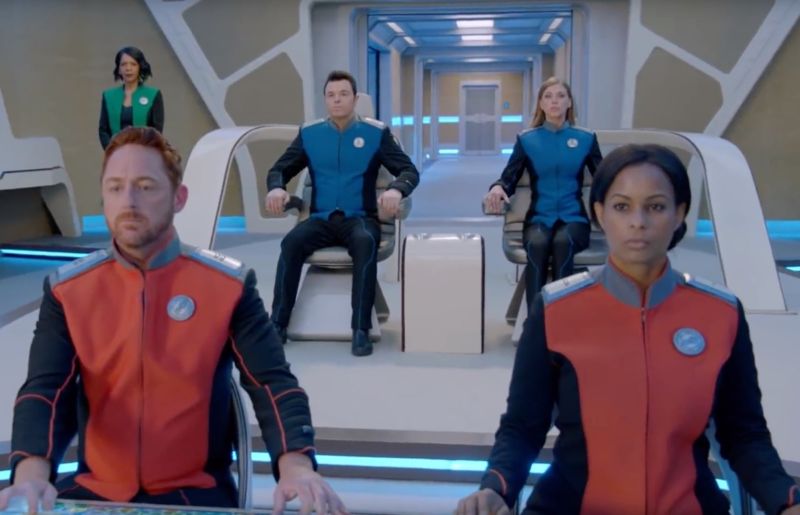
Fox’s sci-fi series The Orville closed out a terrific second season with an ambitious finale that showcased all the elements that make this such an intellectually and emotionally satisfying show.
(Some spoilers below.)
Season 1 of The Orville admittedly had a rocky start, at least in terms of critical reception, garnering just a 19 percent approval rating on Rotten Tomatoes when it debuted. Viewers begged to differ: they gave the freshman series a 91 percent favorable rating, won over by its skillful mix of humor and drama. That’s a tough balance to pull off, but The Orville succeeds admirably. Season 2 won even more fans. This is a smart series that combines humor and witty dialogue with cutting-edge science, ethical musings, the occasional literary reference, and genuine heart. (For more on the science behind the series, see our interview with writer/producer Andre Bormanis.)
Series creator and star Seth MacFarlane (The Family Guy, Cosmos), who plays Captain Ed Mercer, was a huge fan of Star Trek growing up, particularly The Next Generation. The Orville has a similar sensibility. The series is set aboard the U.S.S. Orville (ECV-197), an exploratory spaceship in the service of a 25th century interstellar alliance known as the Planetary Union. The show has a similar standalone episodic structure, especially in its first season, and the same strong social conscience. The original Star Trek, after all, made waves with the first on-air inter-racial kiss. The Orville continues that tradition, delving into gender identity, addiction, bigotry, the pros and cons of social media, and superstition versus rationality, to name a few.
Ultimately, it’s the how the writers develop the various interpersonal relationships that makes the series shine. In the pilot, Ed’s marriage to Commander Kelly Grayson (Adrianne Palicki) ended in divorce after he caught her in bed with a Retepsian archaeologist archaeologist named Darulio (Rob Lowe). A year later, Ed takes command of the Orville with Kelly as his second-in-command, and much of that first season is the crew learning to work together (and learning more about themselves) while exploring interstellar space.
-
USS Orville crew members Lt. John LaMarr, First Officer Kelly Grayson, Chief Medical Officer Claire Finn, Captain Ed Mercer, Lt. Cmmdr. Bortus, and Science & Engineering Officer Isaac.
-
Lt. Alara Kitan (Halston Sage) arm wrestles with Isaac.
-
Lt. Gordon Malloy (Scott Grimes) at the helm of the Orville.
-
Looks like Kelly (Adrianne Palicki) and Bortus (Pater Macon) are in a spot of trouble
-
Exploring an alien planet.
-
Captain Ed Mercer (Seth McFarlane) attempting a toast.
-
Looks like arch enemies the Krill will be back in season 2.
-
Kelly and Bortus engage in a spot of banter.
-
Greetings from Isaac
-
A pile of skulls probably isn’t a good omen.
-
Exterior shot of the USS Orville.
-
Onward to the next adventure.
If season 1 established those myriad relationships, the second season puts them to the test. Ed and Kelly must adjust to dating other people as they move beyond their romantic history toward friendship. Lt. Commander Bortus (Peter Macon) struggles to maintain a meaningful connection with his partner, fellow Moclan Klyden (Chad Coleman), in the wake of a serious conflict over their child. Chief medical officer Claire Finn (Penny Johnson) finds herself drawn romantically to the Orville‘s resident Kaylon, Isaac (Mark Jackson), an AI in a robot body whose mission is to study humans. All these interpersonal developments take place against a backdrop of various white-knuckled adventures.
Among the many S2 standout episodes is “Lasting Impressions,” in which the Orville is transporting a recently discovered time capsule from 2015 to a museum where it will be studied. Among the archaeological artifacts: an iPhone that once belonged to a young woman named Laura (Leighton Meester). The ship’s pilot, Gordon (Scott Grimes), figures out how to hack into the iPhone and uploads to the data to the simulator (the series’ version of the Star Trek Holodeck). The computer creates such a convincing simulation that Gordon falls in love with someone who’s been dead for 400 years. It’s a lovely episode in part because there’s nothing all that special about Laura herself: she could be any pretty young woman working in a department store while trying to make it as a singer. And yet, as Kelly put it, “She reached across four centuries and got a guy to fall in love with her.” That makes her truly extraordinary.
The S2 finale takes on the classic sci-fi trope of the alternate timeline, focusing on Ed and Kelly’s relationship (they are shown to be the heart of the entire series in the process). What if they had never had a second date, never married, never divorced, and so forth? The repercussions turn out to be more far-reaching than anyone could have imagined. It’s an ambitious high-wire feat with callbacks not just to the pilot episode, but to several other subplots, including a S2 two-parter involving the Kaylons—and a gut-wrenching choice that Isaac must make between his people and the humans he has come to know. To pull all those disparate narrative and thematic threads together after 13 episodes is pretty darn impressive.
There’s no word yet whether Fox will renew The Orville for a third season (ratings have been middling, in the 3 million viewers per episode range). Here’s hoping the network recognizes the value of what they’ve got, and sticks by the intrepid team behind the show.
https://arstechnica.com/?p=1495185

